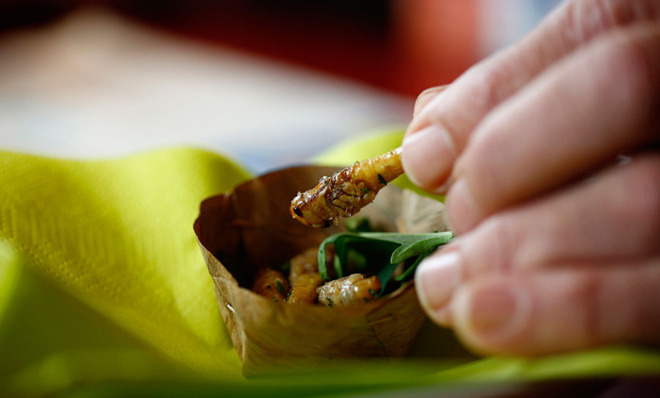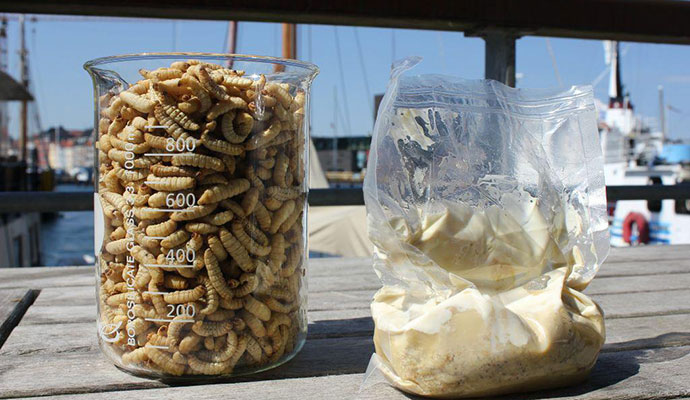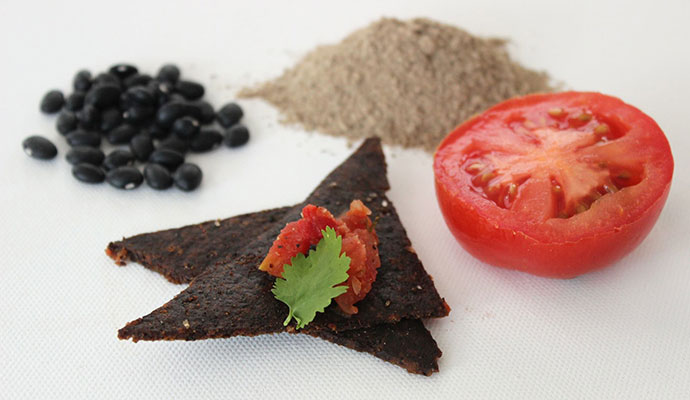Why insects are the future of food
Are locusts, beetles, and crickets the key to feeding a growing planet?

A free daily email with the biggest news stories of the day – and the best features from TheWeek.com
You are now subscribed
Your newsletter sign-up was successful
AT FIRST MY meal seems familiar, like countless other dishes I've eaten at Asian restaurants. A swirl of noodles slicked with oil and studded with shredded chicken, with the aroma of ginger and garlic. And then I notice the eyes. Dark, compound orbs on a yellow speckled head, joined to a winged, segmented body. I hadn't spotted them right away, but suddenly I see them everywhere — my noodles are teeming with insects.
I can't say I wasn't warned. On this warm May afternoon, I've agreed to be a guinea pig at an experimental insect tasting in Wageningen, a university town in the central Netherlands. My hosts are Ben Reade and Josh Evans from the Nordic Food Lab, a nonprofit culinary research institute. Reade and Evans lead the lab's "insect deliciousness" project, a three-year effort to turn insects — the creepy-crawlies that most of us squash without a second thought — into tasty, craveable treats.
The project began after René Redzepi (the chef and co-owner of Noma, the Danish restaurant that is often ranked the best in the world) tasted an Amazonian ant that reminded him of lemongrass. Redzepi, who founded the Nordic Food Lab in 2008, became interested in serving insects at Noma and asked the researchers at the lab to explore the possibilities.
The Week
Escape your echo chamber. Get the facts behind the news, plus analysis from multiple perspectives.

Sign up for The Week's Free Newsletters
From our morning news briefing to a weekly Good News Newsletter, get the best of The Week delivered directly to your inbox.
From our morning news briefing to a weekly Good News Newsletter, get the best of The Week delivered directly to your inbox.
The Food Lab operates from a houseboat in Copenhagen, but Reade and Evans are in the Netherlands for a few days, and they've borrowed a local kitchen to try out some brand-new dishes. I, along with three other gutsy gastronomes, am here to taste the results.
We take our seats at a long, high table as Reade and Evans wheel in a trolley loaded with our meals. We each receive a different main course. I get the Asian-style noodles and fixate on the bug I can see. "That's a locust," Reade says. "[It] was alive this morning. Very fresh." But he's much more excited about another, hidden ingredient: fat extracted from the larvae of black soldier flies (or, to put it less delicately, maggot fat). The whole dish has been stir-fried in it.
"I believe you're the first human being on the planet to have ever been served anything cooked with this," Reade tells me. But not to worry: "I've eaten some of it myself, an hour ago. I'm still alive."
THE NEXT MORNING, Reade and Evans join 450 of the world's foremost experts on entomophagy, or insect eating, at a hotel down the road in Ede. They are here for Insects to Feed the World, a three-day conference to "promote the use of insects as human food and as animal feed in assuring food security."
A free daily email with the biggest news stories of the day – and the best features from TheWeek.com
The attendees are all familiar with the same dire facts. By 2050, the planet will be packed with 9 billion people. In low- and middle-income countries, the demand for animal products is rising sharply as economies and incomes grow; in the next few decades, we'll need to figure out how to produce enough protein for billions more mouths. Simply ramping up our current system is not really a solution. The global livestock industry already takes an enormous toll on the environment, gobbling up land and water. It's a potent polluter, thanks to the animal waste and veterinary medicines that seep into soil and water. And it emits more greenhouse gases than planes, trains, and automobiles combined.
The insect authorities assembling in Ede believe that entomophagy could be an elegant solution to many of these problems. Insects are chock-full of protein and rich in essential micronutrients, such as iron and zinc. They don't need as much space as livestock, emit lower levels of greenhouse gases, and have a sky-high feed conversion rate: A single kilogram of feed yields 12 times more edible cricket protein than beef protein. Some species of insects are drought resistant and may require less water than cows, pigs, or poultry.

Insect meal could also replace some of the expensive ingredients, like soybeans and fish meal, that are fed to farm animals, potentially lowering the cost of livestock products and freeing up feed crops for human consumption. As a bonus, bugs can be raised on refuse, such as food scraps and animal manure, so insect farms could increase the world's supply of protein while reducing and recycling waste.
Officials at the United Nations Food and Agriculture Organization (FAO) became interested in the role of insects in food security about a decade ago, after documenting the significant part that insects play in Central African diets. Since then, the FAO has been commissioning studies, issuing reports, and arranging small meetings on eating insects. The gathering in Ede is the culmination of all these efforts — the first major international conference to bring together entomologists, entrepreneurs, nutritionists, chefs, psychologists, and government officials.
Over the next three days, participants will lay out their vision for the future. It is ambitious and optimistic. They will speculate about creating an insect aisle at the supermarket and fast-food restaurants that serve bug burgers. They will imagine putting packages of "beautiful, clean" shrink-wrapped mealworms on display at the meat counter, alongside the skirt steak and chicken wings. And they will dream about a world in which forests are thick, land is fertile, the climate is stable, water is clean, waste is minimal, food prices are low, and hunger and malnutrition are rare. But are we ready for six-legged livestock?
AT LEAST 2 BILLION people worldwide eat insects. Yellow jacket wasp larvae are popular in Japan, cicadas are treasured in Malawi, and weaver ants are devoured in Thailand. Termites, a food favorite in many African nations, can be fried, smoked, steamed, sun-dried, or ground into a powder. The list of edible insect species is at 1,900 and growing.
Laura D'Asaro's first brush with entomophagy came in Tanzania. In the summer of 2011, D'Asaro — a tall, freckled Harvard student with a relentlessly cheerful disposition — had gone to East Africa to take classes in Swahili. One day, she came across a Tanzanian woman standing by the side of the road, selling fried caterpillars out of a big basket. D'Asaro, an on-again, off-again vegetarian, wasn't sure she wanted to eat an insect, but curiosity trumped apprehension. "When else am I going to try fried caterpillar?" she wondered. So she tried not to look too hard at the brown, inch-and-a-half-long caterpillar as she placed it in her mouth and chewed. She was pleasantly surprised — the texture and the taste reminded her of lobster.
When the summer ended, D'Asaro returned to the U.S. and moved on with her college life until, two years later, she stumbled across an article on the environmental benefits of bug eating. "All these things clicked," she recalls.
D'Asaro decided to start a company to introduce insects to American diners and enlisted two of her college classmates to join her. They began ordering boxes of bugs from pet-food companies and playing around in the kitchen, making waxworm tacos and smothering crickets in soy sauce. "We were immediately very impressed with the taste of it all," D'Asaro says. But when they shared samples with friends, it did not go well. "People seemed very frightened."
They had run smack into what may be the biggest hurdle in expanding insect cuisine: getting people to eat it. Some foods, like chocolate, sell themselves. Insects are not one of those foods. "Insects," says Paul Rozin, a psychologist at the University of Pennsylvania, "are disgusting. It's not that insects taste bad. It's that the idea of an insect is upsetting to people."
Why do we find insects so disgusting? Because they're animals. As a general rule, most of the foods that humans find disgusting are animal products, and most animal products are disgusting; even the most insatiable carnivores eat only a small fraction of the species that exist on the planet. Many insect species are found on, in, or around waste, and they're commonly associated with dirt, decay, and disease, all of which can significantly up the yuck factor.
D'Asaro and her partners realized that they'd need to ease consumers into the idea of bug gastronomy, so they abandoned the idea of serving whole insects and decided to work instead with cricket flour, which could be invisibly incorporated into familiar foods. They decided to launch their company, which they named Six Foods, with a product Americans already love: chips. They created Chirps, a triangular chip made of black beans, rice, and cricket flour, which is lightly spritzed with oil and then baked. Chirps are high in protein and low in fat and taste similar to tortilla chips, D'Asaro says, although the cricket flour adds a slightly nutty, savory flavor.

In some ways, Chirps are a Trojan horsefly, a way to sneak bugs into American diets and transform skeptics into insectivores. In the past few years, there's been an explosion in businesses trying to put the "meal" into mealworms. A Belgian outfit called Green Kow makes carrot-mealworm, tomato-mealworm, and chocolate-mealworm spreads. Ento, based in the U.K., sells mealworm and cricket pâtés at food festivals and last year created a pop-up restaurant devoted to insect cuisine. In the U.S., Chapul and Exo sell protein bars chock-full of cricket flour, while New Generation Nutrition, in the Netherlands, has experimented with a falafel-like chickpea-and-buffalo-worm patty.
Then there are the companies that are raising insects for animal feed, such as Agriprotein, which is based in South Africa and building "a damn big fly factory," as co-founder David Drew puts it. The plant is scheduled to open next year and will produce 24 tons of larvae and 7 tons of maggot meal, or MagMeal, every day. Agriprotein plans to create nine more of these factories across the globe by 2020. Enviroflight in the U.S., Ynsect in France, and Protix in the Netherlands have also built large-scale insect production facilities.
Many companies have arrived at the same conclusion as Six Foods — that it's best not to confront consumers with insects too directly. That often involves processing and disguising the bugs, but it can also mean doing a little clever rebranding. Take waxworms, which live in beehives and eat honeycomb. By all accounts, they're delicious: buttery, with a taste reminiscent of bacon. But the word "worm" can be a deal breaker for diners, so Six Foods has rechristened them "honey bugs." Ento calls them "honeycomb caterpillars."
THE CONFERENCEGOERS IN Ede seem to find comfort in telling and re-telling the story of sushi — a strange, foreign dish that showcased raw fish (raw fish!) and yet became not just acceptable but trendy in the West. "There's no question that food preferences can change," says D'Asaro.
I survived the maggot fat, as well as other delicacies like locust tabbouleh, bee larvae ceviche, and tempura-fried crickets. Although I found many of the dishes to be psychologically difficult to stomach, none of them had actually tasted bad. The insects themselves were quite bland.
The edible insect industry is still in its infancy, and it's too soon to tell how it will develop or whether it will succeed. Will we accept insect flour in our snack foods? Will crickets become a grocery store staple?
For their part, Evans and Reade reject the notion that insects will be some sort of silver bullet to food security. Bugs, they say, will be part of the solution only if we are careful and thoughtful about how we integrate them into the food system. "Insects can be a vehicle for something," Reade says. "But it has to be recognized that it's not the insects themselves that are going to make it sustainable. It's the humans."
Excerpted from a piece that originally appeared in MosaicScience.com. Reprinted with permission.
-
 Antonia Romeo and Whitehall’s women problem
Antonia Romeo and Whitehall’s women problemThe Explainer Before her appointment as cabinet secretary, commentators said hostile briefings and vetting concerns were evidence of ‘sexist, misogynistic culture’ in No. 10
-
 Local elections 2026: where are they and who is expected to win?
Local elections 2026: where are they and who is expected to win?The Explainer Labour is braced for heavy losses and U-turn on postponing some council elections hasn’t helped the party’s prospects
-
 6 of the world’s most accessible destinations
6 of the world’s most accessible destinationsThe Week Recommends Experience all of Berlin, Singapore and Sydney